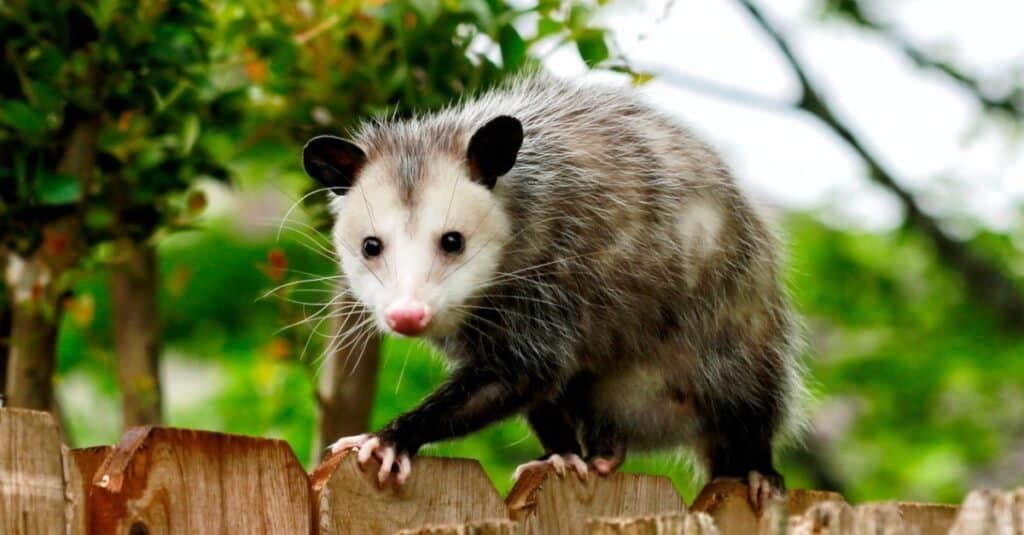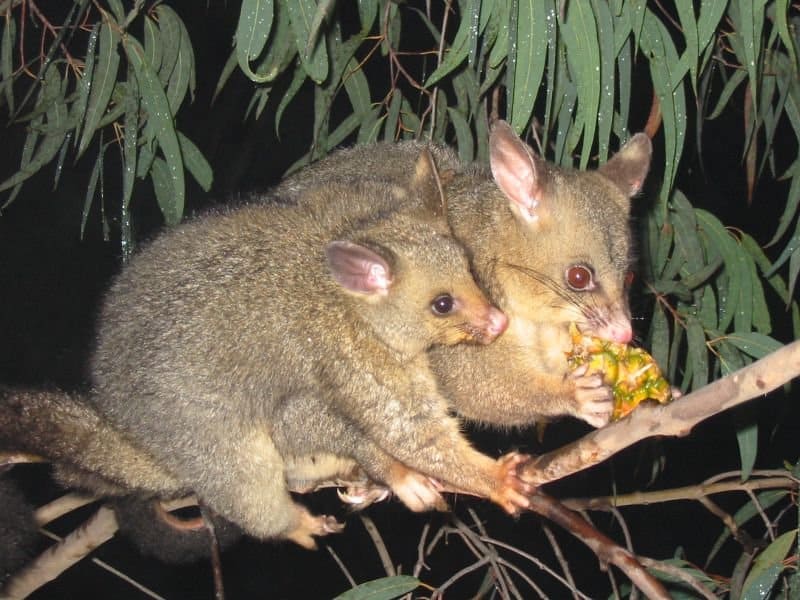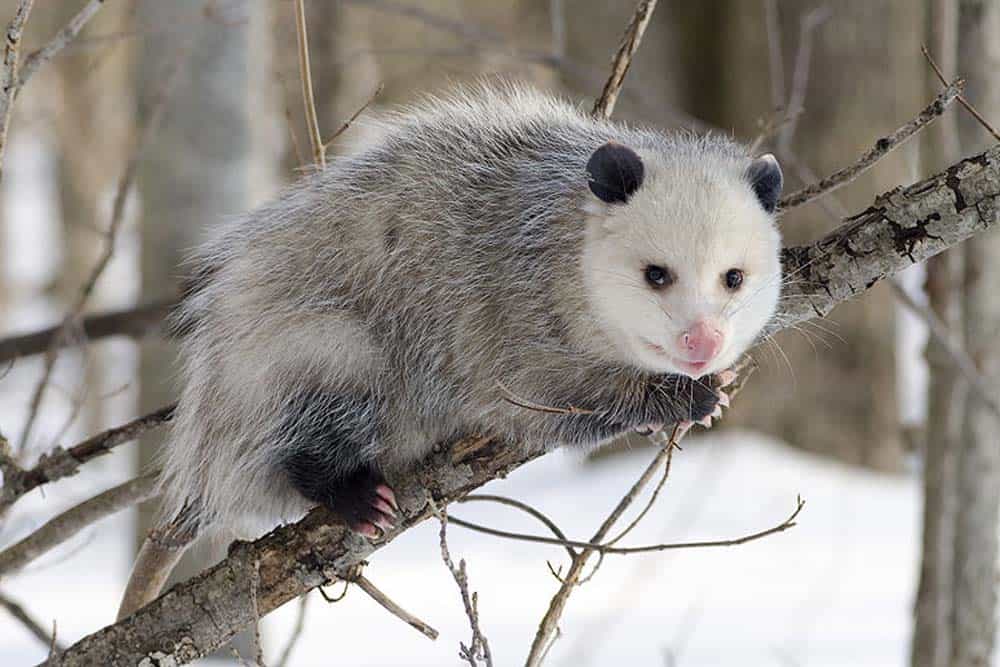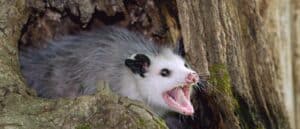Do mothballs or bleach scare away possums? This is a valid question for any homeowner facing an invasion of little furry marsupials. When it comes to keeping these intruders away, there are a number of options available to choose from. Read on to find out if mothballs and bleach are effective solutions as well as other ways you can keep your property possum-free.
Are Possums Pests?
Possums are common pests in Australasia and the Americas, rooting through garbage and causing damage to property. “Possum” technically refers to marsupials in Australia and the surrounding islands while “opossum” refers to the North, Central, and South American versions. However, for the sake of brevity, this article will use the colloquial term “possum” to refer to both types.
Do Mothballs or Bleach Scare Away Possums?

Mothballs and bleach effectively deter possums because of their unpleasant smells.
©Bryce McQuillan, CC BY-SA 2.0, via Wikimedia Commons – License
Mothballs and bleach both effectively scare away possums. The reason these repellants work is simple: possums can’t stand the smell. Their sense of smell is extremely keen, keener than any of their other senses. This is an advantage when it comes to sniffing out their next meal, but it can also work against them in certain situations.
The Pros and Cons of Mothballs and Bleach
There are a number of pros and cons to using mothballs and bleach as deterrents. Understand what you hope to achieve and the potential drawbacks before selecting a method.
Mothballs
Possums dislike the smell of mothballs, specifically the presence of naphthalene. To use mothballs to deter possums, simply place them at strategic locations around the property in question. They are most effective in enclosed spaces like attics.
Pros
- Mothballs are an effective deterrent to possums.
- They are readily available and easy to place around the home.
- As opposed to various spray repellants, mothballs are dry, making them ideal for use around the house.
Cons
- The camphor in mothballs is toxic to animals when ingested. Do not place mothballs where small children or pets can reach them.
- Mothballs may smell unpleasant in excessive quantities.
Bleach
Because of its odor, bleach is a great way to ensure possums keep their distance. Experts recommend mixing one part bleach with 10 parts water to make a spray. Spray it in strategic areas around the house or yard to repel possums.
Pros
- Bleach is cheap and readily available in most stores.
- It is an effective solution to the possum problem.
Cons
- Bleach is an irritant and may cause breathing problems in at-risk individuals.
- It may cause damage to soft surfaces around the house.
- It has a strong, distinctively unpleasant odor.
Other Ways to Scare Away Possums
Mothballs and bleach are not the only ways to deter possums from coming around. Below are six other ways to keep these pesky marsupials off your property. Check out the pros and cons of each to decide which solution is right for you.
1. Blood Meal

Possums detest the smell of blood meal, making it an effective deterrent.
©iStock.com/galinast
Blood meal is a powder made from the blood byproducts of slaughtered cattle and hogs. Gardeners and farmers use it as a nitrogen-rich organic fertilizer for plants. Some animals, like possums, detest the smell of blood meal and won’t come near it, making it a great natural deterrent.
Pros
- Blood meal is an effective deterrent for possums and other garden pests.
- It’s a natural repellant without harsh chemicals.
- In moderate amounts, blood meal benefits most plants, including garden produce.
Cons
- The smell of blood may attract carnivores.
- Applied too liberally, blood meal may give off an unpleasant smell.
- It is not suitable for use on nonorganic matter.
2. Wolf or Fox Urine and Pet Fur
Possums are keen to avoid predators of all kinds, including wolves, foxes, dogs, and cats. Placing wolf or fox urine or pet fur around the property is a natural way to establish territory and repel ever-wary possums.
Pros
- Wolf and fox urine are readily available for purchase online and in some stores. Pet owners also have an easy source of hair or fur.
- Both animal urine and pet fur are totally natural and non-toxic.
Cons
- Urine may cause an unpleasant odor and isn’t suitable for use around the house.
- The use of wild animal urine may cause confusion for household pets.
3. Ammonia
Ammonia is a gaseous mixture of nitrogen and hydrogen. It is a common additive in household cleaners. Some people recommend using splashes of ammonia or ammonia-soaked rags to deter possums. One study has found that ammonia is effective as a deterrent.
Pros
- Possums hate the sharp smell of ammonia and avoid it, making it an effective deterrent.
- Ammonia is available in most supermarkets at a relatively cheap price.
Cons
- Ammonia is corrosive to the skin and toxic if inhaled. Do not use it around the house or garden if children or pets are present.
- The smell is powerful, especially in enclosed spaces, and may cause an unpleasant lingering odor.
4. Some Food Products

Food generally attracts possums, but certain foods like garlic or hot peppers may have the opposite effect.
©Peter Firminger / CC BY 2.0, Flickr – License
It may not sound wise to use food to deter food-seeking possums, but certain culinary delights for humans are nightmare fuel for these marsupials. These include garlic and garlic oil, onion, molasses, hot peppers, hot sauce, and cayenne pepper. Place or grow garlic or onion around the garden or make a plant spray by mixing water with garlic oil, molasses, hot peppers, hot sauce, or cayenne pepper.
Pros
- Possums hate the smell and taste of all these common foods and will avoid them like the plague.
- These are all natural, non-toxic products.
- Every ingredient in this list is readily available at any grocery store.
Cons
- Most of these products carry a distinct odor and may be unpleasant for humans as well as possums.
- They aren’t suitable for use on nonorganic matter.
5. Motion-Activated Sprinklers
One way to deter possums is to install motion-activated sprinklers on the property. Possums startle easily and won’t take kindly to a sudden spray of water in the dark of night.
Pros
- Sprinklers are harmless to all kinds of animal life, making them a great natural deterrent.
- They are a low-maintenance way to consistently deter possums.
- The spray is beneficial to lawns and gardens.
Cons
- Motion-activated sprinklers turn on regardless of who or what activates them, limiting movement around the property.
- They may result in higher water bills due to frequent activation.
6. Traps

It may be tempting to set traps for possums, but they come with a number of drawbacks.
©Cody Pope, CC BY-SA 2.5, via Wikimedia Commons – License
Some people view possums as a threat that must be dealt with decisively. Though many are opposed to both lethal and nonlethal traps on principle, they remain an option for dealing with possums in some parts of the world.
Pros
- Nonlethal traps allow homeowners to relocate possums to another area.
- Lethal traps eliminate individual possums from the property permanently.
- Some possums recognize the presence of traps and avoid the areas around them.
Cons
- Many traps are inhumane and cause unnecessary suffering, even nonlethal versions.
- Traps are less effective than other deterrents as possums often simply avoid them or they don’t work as their purchasers intend.
- Traps may cause harm to people and animals on the property, including children and household pets.
- Traps, both lethal and nonlethal, may be illegal in your area. Always check with local authorities before purchasing.
- Relocation can be tricky and dangerous for both possums and humans. In Australia, it’s illegal to relocate possums without a special permit; trapping them is illegal due to their protected status. A licensed professional is always the best option for relocating wildlife of any kind.
When it comes to deterring possums, there is a wide range of possibilities. Review your options carefully to determine which one is right for you.
The photo featured at the top of this post is © iStock.com/randimal
Thank you for reading! Have some feedback for us? Contact the AZ Animals editorial team.






